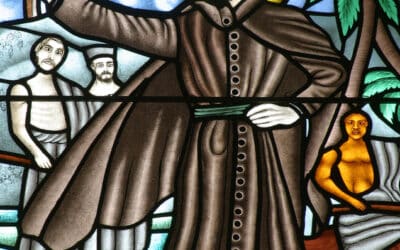One day, Jesus Christ sat on a hill and started preaching. By the time he finished his sermon, the most famous in history, he had raised the world’s understanding of anger, lust, divorce, retaliation, loving your enemies, helping the needy, fasting, judging others, and other moral issues. He also taught that the Ten Commandments would always be the sure moral norm (c.f. Mt 5-7). School choice is rooted in the Commandments, specifically the Fourth and Seventh Commandments.
The Fourth Commandment tells the individual how to act towards parental and public authority and how public authority should operate in society. A society is “a social organization of persons cooperating for a common purpose of benefit to all.” The most numerous society is the family, the fundamental matter that forms larger societies such as the state. Pope Paul VI called families the “cell of society.”
If unobstructed by excessive and sinful inequalities, families can attain schooling and the other goods of life in cooperation with God’s help. In other words, if you stay out of their way, families will take care of themselves with the help of divine providence and the common good. Pope Pius XI had that in mind when he wrote, “Just as it is gravely wrong to take from individuals what they can accomplish by their own initiative and industry and give it to the community, so also it is an injustice and at the same time a grave evil and disturbance of right order to assign to a greater and higher association what lesser and subordinate organizations can do. For every social activity ought of its very nature to furnish help to the members of the body social, and never destroy and absorb them. (Quadragesimo Anno)” Therefore, the family has a right to do what it deems best in keeping with just laws, and states and their agencies should not interfere.
Parents are their children’s first and foremost educators, and schools assist them. Parents must, therefore, be free to choose schools according to their conscience. That’s why we need the plurality of schools we see today: public, charter, magnet, private, religious, cyber, and home schools. Parents can best evaluate them and choose the most suitable for their children.
Schools cultivate intellect, imagination, and the senses; develop reason, will, feelings, and emotions; promote a just hierarchy of values; encourage justice and prudence; pass along the students’ culture; prepare them for work; and promote reciprocal giving of different cultures and lived experiences. What are schools due because they make this enormous contribution to society?
That is a question about justice: the will to give God and neighbor what they are due. The Seventh Commandment suggests an answer because it teaches us what is truly just regarding the world’s goods.
One form of justice is called distributive justice. It concerns what society owes the citizens who contribute to it in proportion to their contribution. According to distributive justice, states must support those who are schooling the children residing in the state. States act according to distributive justice, for example, when they make monetary contributions to public school districts’ budgets.
For the same reason, states should directly support all other types of schools operating according to the state’s standards. However, states have historically understood constitutional law, specifically establishment and free exercise clauses, in such a way that they have not given money directly to Catholic schools. Instead, some states only give Catholic schools non-monetary support like books, transportation, and meals.
Other states use programs to channel money indirectly to Catholic schools and other schools. The programs fall into different categories with names that describe how they function: Education Savings Accounts, School Vouchers, Tax-Credit Education Savings Accounts, Tax-Credit Scholarships, and Individual Tax Credits and Deductions. Pennsylvania, where I reside, has a kind of ‘Individual Tax Credits and Deductions’ program called the Educational Improvement Tax Credit (EITC) program. The program distributes funds through approved nonprofit entities called scholarship organizations, pre-kindergarten scholarship organizations, opportunity scholarship organizations, and educational improvement organizations.
These programs are better than nothing, but we shouldn’t overlook that they reveal a disparity: states directly support public schools and indirectly support Catholic schools and other schools.
The programs are complex. Many organizations participate—Pennsylvania has approved over 200 of them for its EITC program—and every dollar is regulated as it moves from its source to schools. Families need help to navigate. Expert lay apostolates are assisting in these matters, especially for Catholic families.
What are lay apostolates? The Church is the baptized faithful: some are ordained ministers called clerics, and the others, who carry out their lives in the world’s secular activities, are called the laity or lay people. Jesus sends clerics and the laity to spread his loving Kingdom worldwide. Every such activity is called an apostolate; when the laity does them, they are called lay apostolates.
Lay apostolates serve the hungry and thirsty, poorly clothed and unsheltered, sick, imprisoned, and other groups. Many apostolates work on behalf of families; some support school choice for parents.
For example, in Pennsylvania, Business Leadership Organized for Catholic Schools (BLOCS) is an expert in operating the state’s EITC scholarship program. It is also a lay apostolate that former Education Secretary William Bennett described as the most successful scholarship organization in the country. During the fiscal year ending in 2023, BLOCS gave over 17,000 scholarships that directed more than $100 million to Catholic schools and other schools.
For Catholic families or schools looking for financial assistance or contributors wanting to financially support Catholic schools, visiting a diocesan website and clicking on the tab for Catholic schools (look for financial aid links) is an excellent place to find the lay apostolates who can help.
Image by Gage Skidmore via Creative Commons.







0 Comments